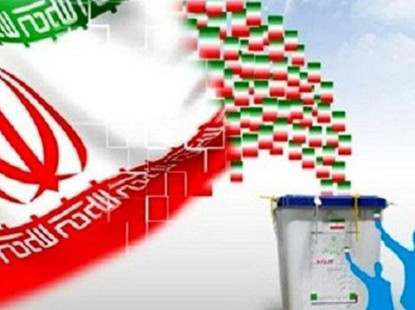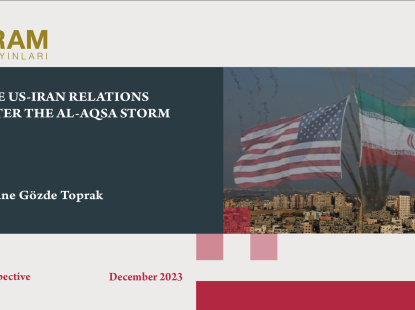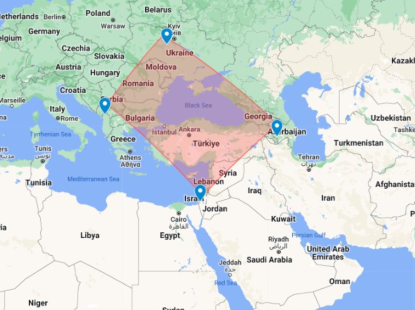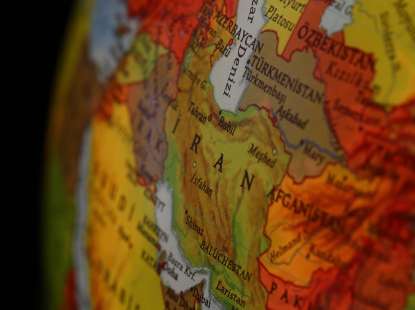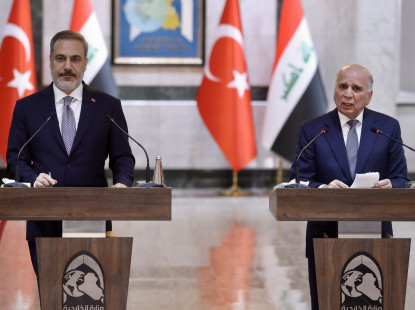The United Arab Emirates' Flexible Approach towards Iran
Since the United Arab Emirates (UAE) gained independence in 1971, Abu Dhabi’s relationship with Iran has been primarily contentious. Under the Shah, Iran’s aspirations to become the regional hegemon put the UAE at unease. In this context, immediately after the British departure from the Persian Gulf, Tehran asserted its control over three Persian Gulf islands strategically located near the Strait of Hormuz—Abu Musa, Greater Tunb, and Lesser Tunb. By 1979, Iran’s Islamic Revolution transformed Iran into a hostile and predatory state from Abu Dhabi’s perspective. Today, the UAE’s distrust of the Islamic Republic continues.
Iran’s brand of Shiism, size, population, and conduct in the Arab states, have historically influenced UAE’s strategic thinking. This can explain why during the Iran-Iraq war (1980-1988) the leadership in Abu Dhabi financially supported Saddam’s war against Tehran. More recently, Tehran’s large ballistic missile arsenal has worsened the UAE’s threat perception. Reports indicate that between 2016 and 2020 the UAE’s annual defense spending stood at an average of USD 26.6 billion per year.
Saddam Hussein’s fall in 2003, which ushered in a new era of Iranian influence and Shi’a paramilitary muscle in Iraq, heightened Abu Dhabi’s sense of vulnerability to the alleged Iranian threat. By 2010, the UAE’s ambassador to Washington, Yousef al-Otaiba, said: “Our military, who has existed for the past 40 years, wake up, dream, breathe, eat, sleep the Iranian threat... there’s no country in the region that is a threat to the UAE, it’s only Iran.” In May 2018, the UAE was one of the only four countries in the world which openly supported President Donald Trump’s decision to unilaterally pull the US out of the Joint Comprehensive Plan of Action (JCPOA), a nuclear accord which Abu Dhabi believes was suboptimal and negotiated in ways which left the Gulf Cooperation Council (GCC) member-states vulnerable to Iran’s regional ambitions.
Nonetheless, despite Abu Dhabi’s support for the Trump administration’s so-called “maximum pressure” campaign against Iran, the UAE has historically cautioned against the risks of isolating Tehran. The US State Department documents declassified by the National Security Archive indicate that the Emirati officials previously warned their American counterparts of the potential dangers of isolating and pressuring Iran. In June 1995, the US Embassy in Abu Dhabi sent a cable to then-Secretary of State Warren Christopher which cited an unnamed Emirati official cautioning that “If Iran were to be pushed over the brink, the aftermath could pose risks for the entire region.” More recently, a series of acts of sabotage in waters near the UAE last year and the Aramco attacks of September 2019 left the Emiratis nervous about where their country could find itself in the event of an all-out military confrontation in the Persian Gulf involving Iran. In essence, while the Emiratis favor deterring Iran from potential aggressions, they are justifiably concerned with the consequences of a military confrontation which could engulf the entire region.
A Path to Diplomacy
Within this context, throughout the past 15 months the Emiratis have seemingly broken ranks with the Saudis in terms of approaching Iran. This is not to say that Abu Dhabi ceases to view Iran as a serious threat. But instead, the UAE’s leadership has carefully reassessed its strategies for dealing with the Islamic Republic. In March 2020, Abu Dhabi sent 7.5 tones of medical equipment to Tehran to assist Iran in the fight against the COVID-19 pandemic, which has ravaged the country. The following month, the Foreign Ministry in Tehran said that such aid from the UAE to Iran amid the coronavirus crisis has added “reason and logic” to bilateral relations.
Part of the reason for the UAE’s modest diplomatic outreach to Iran is rooted in the fact that the UAE, like Washington’s other regional partners, remains skeptical of Trump’s commitment to its security, should tensions in the Persian Gulf lead to a military confrontation. As such, the Emiratis seeks to minimize tensions with Tehran, in order to keep themselves on the sidelines of a potential conflict or, at minimum, to avoid Tehran’s wrath.
In late July 2019, the UAE sent two official delegations to the Islamic Republic for talks on issues of importance to both Abu Dhabi and Tehran, such as maritime security. The Foreign Ministry of the UAE announced its “satisfaction” with these two delegations that went to Iran. Although a “quiet intelligence backchannel” has constantly existed between the two countries, the UAE’s modest diplomatic outreach just over a year ago was significant within the context of Iran’s purported actions targeting the UAE and the Emirati interests.
In the same context, in August 2020, the UAE’s Foreign Minister Abdullah Bin Zayed held a rare virtual call with his Iranian counterpart Mohammad Javad Zarif. The two foreign ministers amicably discussed issues of shared interest, such as the two countries’ response to the COVID-19 pandemic, without any mention of the attacks on the Emirati soil just a year earlier. In late June, the Emiratis also indicated a willingness to mend ties by sending more aid to Iran to help the country while it continues its difficult battle against the pandemic.
Economic interests and geography always weigh heavily into the UAE’s approach towards Iran. In other words, while the UAE is deeply concerned with Iran’s foreign policy, the Arab country enjoys a healthy and vibrant trade relationship with its neighbor across the Persian Gulf. In fact, their bilateral trade in 2018 amounted to USD 19 billion. Dubai, which is home to a large number of Iranians who maintain large businesses in the city, plays an indispensable role in bilateral trade relations, as well as tourism. With little elsewhere to go, because of the US sanctions, Iranians leverage Dubai’s relatively well-regulated and secure financial market and business infrastructure to access the global economy and park investments in a less risky market—unlike in Iran where inflation has skyrocketed in recent years. This is a major contrast to Saudi Arabia which has, essentially, no trade relationship with Iran to speak of.
As previously mentioned, the UAE also correctly understands that a military confrontation with Iran would be devastating, making diplomacy a necessity, especially given the risks of “maximum pressure” spiraling out of control. Geographical proximity, the smaller GCC states’ lack of strategic depth, Tehran’s large ballistic missile program, and the Islamic Republic’s material support for the Houthi rebels have left Arab Persian Gulf countries feeling vulnerable and surrounded. The UAE, much like other countries in the region, relies on critical infrastructure like desalination plants to maintain life in the Arabian Peninsula’s inhospitable climate. Any major military confrontation that targeted these assets would lead to an immediate humanitarian catastrophe, rendering the UAE more or less uninhabitable. Fully aware of this reality, Abu Dhabi then understands that diplomacy is truly the only option.
The UAE’s diplomatic engagement with Iran, however, is a balancing act between a desire to maintain stable relations and placate its foreign partners, allies, and neighbors. Saudi Arabia provides the biggest challenge to this approach. When looking at the GCC crisis, for example, one of Saudi Arabia’s demands is that Qatar distance itself from Tehran and reduces the current level of relations between Doha and Tehran. While perhaps unlikely at this point, it would not be surprising if Riyadh eventually tried to put pressure on Abu Dhabi to distance itself from Iran. By the same token, the UAE could position itself as a diplomatic bridge between the Saudis and Iranians if Riyadh were to prepare for engagement with Tehran, even through indirect means.
Turkey
It is critical to take stock of the ways in which Turkey factors into the UAE’s Iran calculus. Currently, it seems that Abu Dhabi sees a graver threat in Turkey than in Iran. This is largely due to the Turkish-Qatari axis’ support for projects of so called political Islam in the Sunni Arab world, which Abu Dhabi believes poses a serious threat to its ruling families. The extent to which Tehran is under so many sanctions, Iran’s Shi’a identity, and the sectarian dimensions of the Islamic Republic’s regional foreign policy have an impeding effect on Tehran’s regional outreach. Meanwhile, Turkey, as a historical Sunni Muslim power and a NATO member with a stronger economy compared to Iran, represents a far graver concern to the UAE. Thus, the UAE’s withdrawal from Yemen and subsequent strategic pivot towards the Libyan theater occurred within the context of Abu Dhabi’s modest diplomatic outreach to Tehran which was partly about the UAE’s shifting priorities.
There are also conflicts of interests between Ankara and Tehran which the UAE is keen to leverage to its advantage. Abu Dhabi does not want Trump’s “maximum pressure” campaign against Tehran to benefit Ankara. To the contrary, the Emiratis are willing to make some concessions to Iran and accept a higher level of Iranian involvement in the Arab states if that can serve as a bulwark against the Turkish expansionism. Arguably, the UAE’s rapprochement with Syria’s government in late 2018 was a case in point, especially considering Abu Dhabi’s diplomatic support for Iranian-backed, pro-Assad forces that have directly clashed with the Turkish military and Ankara-sponsored rebels in Idlib.
Israel
The UAE-Israel “peace deal”, also known as the Abraham Accords, is aimed at countering both Tehran and Ankara. Nevertheless, the Emiratis have sought to assuage the Iranian concerns by announcing that the agreement is “about the UAE, Israel, and United States,” and not about Iran. Moreover, the Emirati concerns about expanding Turkish influence in the region probably did more to push Abu Dhabi towards the Abraham Accords than the UAE’s fears of Iran’s growing clout in the Middle East. Hussein Ibish of the Arab Gulf States Institute in Washington observes that the timing of agreement “has nothing to do with Iran… The word that would sum it up best is Turkey.” Writing for the Daily Sabah, Batu Coşkun has also argued that “the [UAE’s] move [vis-à-vis Israel] was actually made against Turkey as much as Iran, perhaps even more so.”
Abu Dhabi seeks to leverage its relationships with both Tehran and Tel Aviv to weaken Ankara’s geopolitical position in the Middle East. This strategy depends on the UAE and its allies successfully preventing either Iran or Israel from moving closer to Turkey, which leaves Abu Dhabi needing to strike a difficult balance that is anything but guaranteed to succeed.
“This is a very ambitious strategy that is akin to juggling too many balls at a time, but it is the best UAE can hope to do given that it is punching well above its weight in this game of major-league geopolitics,” explained the Center for Global Policy’s Kamran Bokhari. “What this means is that the UAE has to simultaneously manage way too many players with their own unique sets of expectations. In situations like these, a lot can go wrong, and therefore this strategy is untenable in the long run where Turkey and Iran can be expected to be competing for influence in the Arab world and UAE and other similar Arab actors will have a secondary role.”
Furthermore, the Iranian anger and even issuance of threats directed at the Emiratis in response to the UAE-Israel deal adds a new layer of complexity to the multifaceted relationship between Abu Dhabi and Tehran. There is also a grave risk that the Abraham Accords will result in Ankara and Tehran becoming increasingly aligned on regional issues.
United States: Prospects for a Biden Presidency
There is no denying that the uncertainty of the US domestic politics represents difficult challenges for Abu Dhabi. On the one hand, if Trump is re-elected, it would make sense for the UAE to double down on its support for the “maximum pressure” campaign to further cement Abu Dhabi’s special relationship with Trump. After all, the American president not only withdrew the US from the Iran nuclear deal, but it also agreed to sell F-35s to UAE despite Israeli objections. The sale of these 5th generation fighter aircrafts are both politically and symbolically important for the UAE because it would make it the only Middle Eastern country after Israel to operate these highly advanced aircraft.
A Biden presidency, however, would make Washington less amenable to the Emirati demands. The former Vice President already pledged to return the US to the JCPOA unsettles the leadership in Abu Dhabi. If Biden takes the helm in January and the US becomes far less committed to the UAE and other GCC states’ quest to become increasingly geopolitical powerful relative to Tehran, Abu Dhabi would readjust. Within this context, the UAE is shrewdly hedging its bets. The UAE is both backing Trump’s “maximum pressure” agenda in many instances, while also engaging Iran diplomatically which can pave the way for better Emirati-Iranian relations.
“The UAE is looking to remain the relevant regional actor for either a Trump or Biden administration,” according to Sanam Vakil, a leading scholar of Iran and the Persian Gulf at the London-based Chatham House.1 “By normalizing relations with Israel, the UAE could be setting itself up to be an interlocutor for a US government that is more distracted and inwardly focused. It is possible that normalization could open opportunities for the UAE to take on the bridging role between Tehran and Washington. Doing so, would enable the UAE to be a party to any future discussions and, in this role, it could elevate its own regional list of grievances against Iran which include the nuclear program, ballistic missiles, regional activities and the dispute over Abu Musa and the two Tunbs.”2
What has been achieved through the UAE’s modest outreach to the Iranians? From the standpoint of regional peace and security, the dialogue between Abu Dhabi and Tehran has helped de-escalate tensions at times in which the temperatures were very high. Furthermore, while the talk of a rapprochement between the UAE and the Iranis a long way off, the ongoing dialogue has the potential to be expanded to include other regional concerns. The engagement which picked up in July 2020 and has continued for the past 14 months, however, does mark a “positive step”.
“On the surface, both sides have achieved some limited gains, but behind the scenes the principle issues are far from being resolved,” said Dr. Vakil. “The UAE has, for the time being, removed itself from Tehran’s line of fire. Despite this shift Abu Dhabi continues to strongly support maximum pressure and remains committed that Iran halt its regional interference.”3
Nonetheless, despite Crown Prince Mohammed bin Zayed (MbZ) and those around him in Abu Dhabi still viewing the Islamic Republic as a grave threat, it is clear that the UAE’s leadership will not see Iran as the only dangerous actor in the region that must be countered. The escalation of tensions in the UAE and Turkey’s “Cold War” will inevitably give Abu Dhabi reason to reassess its views on how to deal with Iran, which MbZ is less keen to challenge than Ankara at this point.
Moreover, with the UAE and Iran sharing a desire to avoid a war with the other, the chances are good that the Emirati and the Iranian officials will continue efforts to de-escalate and find more common ground. Not with standing strong rhetoric from both sides, Abu Dhabi and Tehran have managed to establish a rather pragmatic relationship.
In the grander picture, the UAE’s diplomatic outreach to Iran is a salient example of Abu Dhabi’s determination to forge a foreign policy that is increasingly independent from both Riyadh and Washington. When Abu Dhabi’s decision to lower the temperatures with Iran is viewed within the context of the UAE’s approach to other regional dossiers such as southern Yemen, Syria, and Israel, it is clear that the Emiratis are focused on asserting their independence on the international stage and pursuing interests that are unique to the UAE.
1 Dr. Sanam Vakil, Interview by Author, August 17, 2020.
2 Dr. Sanam Vakil, Interview by Author, August 17, 2020.
3 Dr. Sanam Vakil, Interview by Author, August 17, 2020.
Disclaimer: The viewpoints expressed by the authors do not necessarily reflect the opinions, viewpoints and editorial policies of IRAM.





